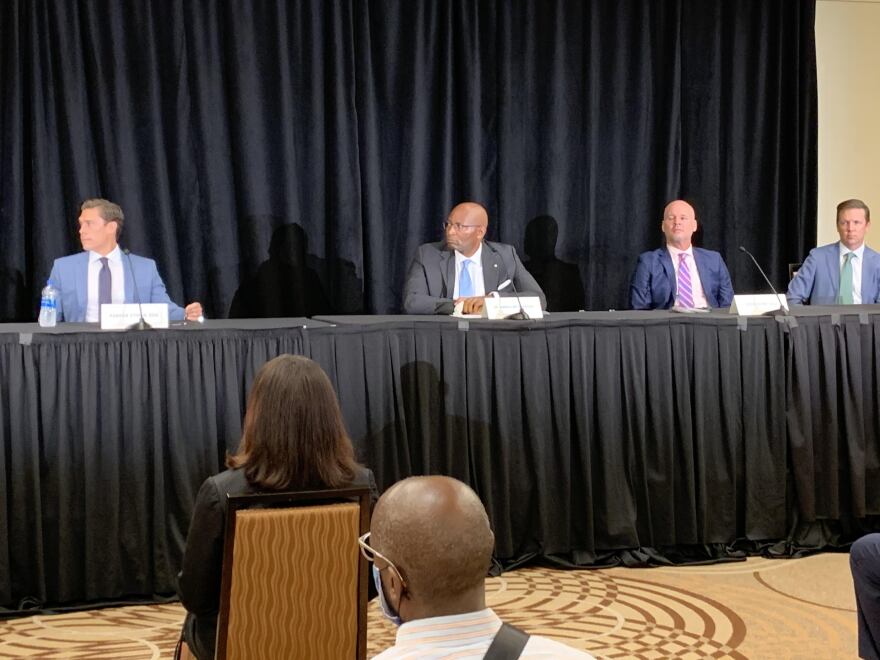With plaintiff attorneys calling this perhaps the “most appalling sexual assault against a group of African-Americans in this country's history,” two Black former student athletes - including former San Francisco 49rs Super Bowl champion Dwight Hicks - described the agonizing process of coming to terms with their sexual abuse by Dr. Robert Anderson during their time at the University of Michigan.
“I had had physicals before, but what happened to me in that room with Dr. Anderson - I have no words for,” Hicks said at a press conference outside Detroit Wednesday morning. Choking back emotion, Hicks recalled coming to the University of Michigan “with all the hopes and dreams” of an 18-year-old, only to be sexually abused by Anderson. The abuse began at his freshman-year physical, Hicks says.
“I knew something was happening that was kind of strange, and I even questioned him. And he said it's part of the process. And so I felt that, I had to suck it up. I'm gonna be a Michigan man. Maybe this is part of it. I don't know. I didn't have the words for it, as an 18-year-old. Because I've just felt that, hey, this is what you have to do.”
Attorneys say more than 100 victims of the now-deceased Michigan sports doctor have come forward. At least 80 have officially filed suit against the University, which has hired an outside law firm, WilmerHale, to investigate Anderson’s abuse.
The University is also locked in negotiations with the plaintiffs attorneys, who are calling for a settlement on par with the one Michigan State University reached with the victims of Larry Nassar for some $500 million. To do any less, civil attorney James White said Wednesday, would be to “discount” the suffering of Anderson’s victims, the majority of whom White says are African-American men.
“What I would suggest to our community is, that that was not an accident. Dr. Anderson, like all predators, finds his way into vulnerable communities. And what I've suggested to you folks is that young African-American men in the 1970’s and today, but in particular in the 1970s, were particularly vulnerable. Anderson found that vulnerability. He exposed that vulnerability. It was exposed to the University of Michigan, and they buried it.”

Dr. Airron Richardson, a Chicago physician who attended the University from 1994-1998 and was a member of the U.S. freestyle wrestling team and an alternate for the 2000 Olympic games, according to his attorneys, also spoke publicly about his abuse.
“Initially, I was not eager to participate in a press conference to acknowledge that I endured inappropriate sexual behavior at Schembechler Hall as a former student athlete,” Richardson said.
“There is an emotional toll that confronting the topic takes. I was only able to reach this point with the help of my mother and several close friends. And now I hope to be a voice for the untold numbers of former athletes, some of whom I suspect are now coaches and administrators who experienced similar abuse, but are not ready, able or comfortable coming forward.”
Much of the phrases Hicks and Richardson used to describe the abuse, and the experience of seeing the alleged perpetrator exposed years later, echoed the statements of Larry Nassar victims at his sentencing hearings.

Anderson “violated the trust of his patients and used medicine as his shield,” Richardson said.
He used the inherent trust people have for doctors and the University setting, and twisted it in such a sinister way.”
The comparisons between the Nassar and Anderson cases have been made by victims and attorneys in both cases, to put pressure on the University and call attention to this case. But both Richardson and Hicks spoke about the role gender played in their decision to come forward.
“The shame is real,” Richardson said. “And even as a medical professional, I could recognize that nothing that happened was my fault. But still, it's not something you want to be the first person to speak about or to bring that conversation about. And I was worried about being the face of a survivor. And that could stem from how masculinity is perceived in this country and we're all aware of that. But that is a very real deterrent from people coming forward, and I know many more people who just still did not want to speak about this.”
Hicks says for years he coped with the abuse by suppressing it, and accepting it was medically necessary. That resistance continued even after other victims began stepping forward, he said, and persists among some of his fellow former athletes.
“I was on zoom call with some of the guys, and some of the guys did not want to say themselves personally what happened to them. They didn't want to, as you say, face the music. Because it is personal,” Hick said. “And some people can stand up and speak. And some people cannot. But I think we are our brother's keeper. And that's why I'm here today, to speak up, to give a voice, because something needs to be done desperately. Because it's in all our institutions, from the highest form of government, corporations, it's everywhere.”
Editor's note: The University of Michigan holds Michigan Radio's license.
Want to support reporting like this? Consider making a gift to Michigan Radio today.







